Stephen Roney's Blog, page 21
January 16, 2025
Playing 4D Chess

Trump really is “playing 4D chess.” He learned how to swing a deal as a real estate developer. Consider the Gaza deal. He framed it all as a threat against Hamas: “if the hostages are not freed by inauguration day, there will be hell to pay.” But behind the scenes, the pressure was really on Netanyahu to accept a partial deal. This way, Netanyahu has made concessions, but can frame it as a victory. It’s a win-win, at least for the short term.
He is doing the same with Greenland. Greenland is a financial liability to Denmark, held only for prestige, and Greenland for its part feels colonized. Trump sees the opportunity. Denmark saves face and looks righteous by giving Greenland independence. Greenland can afford this pretense of self-determination now, with US backing. Then it gets to cut a better deal with the US. The US gets to cut Denmark out of any deal, buying wholesale. It’s a win-win.
I think Trump should and will offer Greenland immediate full statehood, to preserve the sense of self-determination.
Now how about Canada?
Alberta’s situation is like that of Greenland. Alberta has been subsidizing the rest of Canada with their energy resources. At the same time, with their carbon tax and their environmental regulations, the Canadian central government has been hobbling the Alberta energy industry.
Perhaps Trump was clever enough to check and realize that energy was a provincial responsibility. Perhaps he was clever enough to see that Canada has recognized the right of provinces to separate. Perhaps he was clever enough to school himself on Western alienation.
With his tariff threats, Trump is shaking that fruit from the tree. He can appeal to Albertan alienation. They have the one card to play against the Trump tariffs.
He can offer Alberta a separate deal. He says he wants to annex Canada; but the value to the US is all in Alberta. Moreover, they are more politically aligned than the rest of Canada with the US; they would probably vote Republican. He can now offer them statehood. Alberta gets to escape their subsidies to the rest of Canada, escape the carbon taxes and the environmental regulations, lower their taxes, and start pumping oil like gangbusters.
Okay, this one isn’t quite win-win. The rest of Canada is left in the lurch, cut off from Alberta’s subsidies and facing stiff tariffs from the USA.
Unless they quickly end equalization payments, kill the carbon tax, end supply management, cut environmental regulations, and start severely restricting immigration.
All of which would be more or less what the Canadian public is demanding.
So, again, win-win. Unless we are governed by idiots.
Uh-oh.
'Od's Blog: Catholic comments on the passing parade.
January 15, 2025
World Historic Figures
 Alexander the Great. Not to be confused with his purple cousin Alexander the Grape, nor his nephew Alexander the Merely Adequate.
Alexander the Great. Not to be confused with his purple cousin Alexander the Grape, nor his nephew Alexander the Merely Adequate.We live in interesting times. Victor David Hanson was saying online that Elon Musk’s accomplishments make him a world-historic figure comparable to Alexander the Great. And he probably has many more years of major accomplishments to go.
And then there is Trump. Trump just seems to have gotten the war in Gaza ended before even taking office. It looks as though he is going to get Greenland to join the US, an acquisition that ought to put him on Mount Rushmore alongside Jefferson—the amount of land is equivalent to the Louisiana Purchase. And I think he has a good shot at getting Canada as well.
I think he will indeed go ahead and impose those heavy tariffs; because his main concern is not the terrorists or the drugs coming across the Northern border. What he really wants is to fund the US government with tariffs so he can lower taxes; although he would be delighted to annex Canada as an alternative. The Canadian economy will collapse. Even more so if the Canadian authorities impose tariffs on American goods in retaliation, as they seem intent on doing. They are alarmingly talking much more about that than about improving the situation on the border. Perhaps, to be fair, because they realize that they cannot satisfy Trump’s demands. But escalating a trade war with the US is walking into a trap. Canada cannot win.
I think the general population of Canada will soon be desperate to join the US to escape the hardships. Trump probably realizes this.
For generations, we have been governed by lawyers and bureaucrats, the clerisy; and to some extent by academics. The problem is that one does not rise in the bureaucracy, or the law, or in academics, through merit. So we are not getting the best minds leading us.
We are now discovering the talents of the entrepreneur. Entrepreneurs rise from sheer merit, their ability to plan complex systems and see opportunities. Trump demonstrably has those talents; Musk demonstrably has those talents. Putting them in service to government is liable to bear rewards.
'Od's Blog: Catholic comments on the passing parade.
January 14, 2025
Rape is Not a Part of Islam

Islam is getting a bum rap in the UK grooming gang scandal. Islam does not enable or endorse the behaviour of these young men. That is the reverse of the truth. It is culture shock.
Coming from a culture with strict rules for the separation of the sexes, severe punishments for rape, strict traditions for female dress, the typical Muslim view of the West is that here, by contrast, everything is permitted. My Pakistani friends used to refer proverbially to “the wicked West.”
We always think this way of proximate foreign cultures: to England, France is always synonymous with sexual license. In Barcelona, a strip joint is named “Baghdad,” and nude dancers are called “exotic.” The most famous stripper in Montreal once had the stage name “Fawzia Amir.” In early Canada, sex fantasies centred around the Indians. No surprise if Muslims think the same about us: in the West, all women are available and everything is permitted.
This is a common expression of culture shock. Finding in some new culture that many familiar norms do not apply, you can easily assume that here there are no norms at all, and everyone is free to do as he pleases.
The initial reaction is to act out your fantasies, here where nobody knows you. The second reaction is to despise these immoral and crazy people, and feel righteous in doing them harm.
This sense is that much more severe when coming from a culture with strict social norms.
So young Muslim immigrants are a bad risk for violence and sexual predation, criminal behavior, and mental illness.
And we are making the same mistake they are, by imagining that such outrageous behaviour is endorsed by and part of Islam.
The fault is in our governments, who are blind or deliberately blind to the importance of culture and cultural difference. And this has nothing to do with racism: race is not culture, and those who suppose they are the same are the most profound racists.
It is callous folly to let in large groups of immigrants from quite different cultures. There will be social breakdown and immense suffering, not least for the immigrants themselves.
We should, in all sanity, prioritize immigrants from cultures with social norms most similar to Canada’s. That means we should give absolute preference to Christians, Jews, Americans in the broad sense of that term, and Europeans.
Failing that, we should give preference to those who have a strong religious commitment. That is, just the opposite of our current thinking, that the problem has something to do with religious “extremism.” A strong faith anchor inoculates against culture shock, and ensures the individual does not act out selfish desires. If these Muslim men in Rotherham and other British cities were good Muslims, they would not behave this way despite temptation.
'Od's Blog: Catholic comments on the passing parade.
January 13, 2025
Sea and Sky
Saint John has a seaside sculpture walk. This is one of the sculptures, randomly chosen.
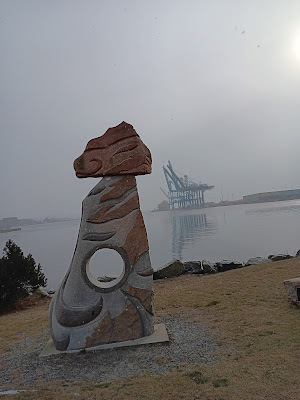
Why? What is the point of this?
The point of art is to express beauty. This is not beautiful. None of the sculptures along the walk are beautiful.
You will object that I am a Philistine who cannot appreciate an abstract sculpture. But that is not quite the issue here. An abstract sculpture is less likely to be beautiful, but it might still be beautiful. Any building is an abstract sculpture, and some architecture is beautiful. I.M. Pei’s purely abstract forms are nevertheless beautiful. A well-cut gemstone is beautiful.
This sculpture, and all the others along this walk, lack the obvious elements of beauty, as defined, for example, by Saint Thomas Aquinas: symmetry, proportion, or balance; clarity; and integrity or a sense of completion. Most modern sculpture seems to deliberately violate all of these elements, actually striving to look off-balance, incomplete, and indistinct in form.
The point of it all seems to be to protest against beauty itself.
Why on earth would anyone want this in a public installation? And, worse, why on earth would anyone want to actually pay for having it?
The present sculpture is titled “Sea and sky.” Nobody needs even a beautiful sculpture simply to express “sea and sky.” We can see both plainly enough. We need art solely to express the unseen.
And there it is, in perfect irony, obscuring the pedestrian’s view of sea and sky.
It illustrates how decadent our culture has become.
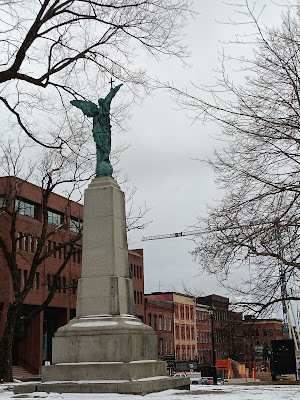 For contrast, some beautiful public art in Saint John: the war memorial.
For contrast, some beautiful public art in Saint John: the war memorial.'Od's Blog: Catholic comments on the passing parade.
January 12, 2025
Liberal Leadership Stakes

The Liberal leadership race is underway.
Were I a Liberal, I would have thought Dominic Leblanc their best choice. He is likeable, projects calm in a tumultuous time, and a good communicator. But Leblanc has rightly and honourably taken himself out of the race because his cabinet responsibilities are too important, given the tariff threat from the US. Running now would look irresponsible. There is, in any case, likely to be another race in a year or two; he might as well keep his powder dry.
Leblanc pulling out in order to tend to his cabinet responsibilities has neatly taken any other current cabinet ministers out of the race. Otherwise his example makes them look bad.
The Liberals’ next best choice, to my mind, was (not is) Christie Clark. She too is likable, and an experienced campaigner. But I think she blew up her candidacy at the gate by lying about never joining the Conservative Party. In a campaign as short as this one, I don’t think she has time to recover. I wonder if she will now bother running. Again, there should be another shot in a year or so, after the collapse; and once people have had time to forget her lie.
This leaves Mark Carney as the next best choice the Liberal have available. Not a great choice. He has the advantage of not being associated in the popular mind with the perceived failings of the Trudeau government. He has the advantage of a financial background, and people are alarmed about the economy. But he has no political experience. His likability or campaign skills are unknown, but unlikely to be good; he has had no chance nor reason to develop such skills. And he must come across as an establishment candidate, an elite globalist, as a former central banker for two nations; at a time when the general mood is populist and highly suspicious of elites.
I can’t imagine why it is worth his while to run. He would surely be wiser to let someone else take the loss, preserve his reputation, and run in a year or two. He was cautious enough not to take the role of finance minister last summer, when he was being talked about as a savior figure, and again when Chrystia Freeland resigned. I expect him to continue to show the same caution. I say he decides not to run.
Given the short time frame and the high bar for entry, I don’t see a chance for a dark horse; or even any candidate not seen as top tier from the start.
Leaving Chrystia Freeland.
She will not do well in the next election. She is closely identified with Trudeau’s policies, and a too-familiar, stale face of the past government. Her public persona is unlikeable, and her manner is irritating.
But she will get her claim to be the first female Liberal leader, and PM, if only for a few weeks.
Let’s see if I’m right.
'Od's Blog: Catholic comments on the passing parade.
January 11, 2025
One Canada or No Canada
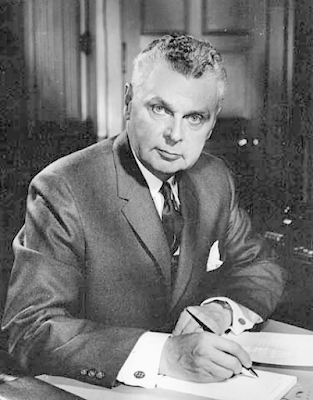 John Diefenbaker
John DiefenbakerI used to respect Andrew Coyne. But he now seems to me to be out of touch. He has grown too comfortable with the CBC and the rest of the commentariat. He now only promotes their narrative. In a recent CBC “At Issue” panel, he observed that Donald Trump had managed to unite Canadians with his proposal for annexation—that is, against Trump.
That is the line the politicians want us to believe. Patriotism, as Johnson said, is the last refuge of the scoundrel. It is always the political move to wrap yourself in the flag.
It is true enough that all the federal party leaders and all the premiers came out immediately saying this would never happen, and talking about tariffs on American goods. But we now, thanks to the Internet, do not need to rely on the politicians to tell us what ordinary Canadians think. I find that the mood on social media is entirely different. I think Coyne is in the Ottawa bubble. Trump has in fact driven a major wedge between the good old Laurentian elite and the people they claim to represent.
If X is a guide, ordinary Canadians seem split into two camps. Both agree the current situation in Canada is untenable. Both believe that Canada is broken. Both believe it is not enough just to vote out Trudeau’s regime. We have discovered with shock that we have no protections for our rights. Another tyrant might always come to power. Moreover, there is no real reason for Canada to exist: the government itself has stripped Canada of any sense of pride or national identity.
One party in this dispute says the best course is to fold the tent, accept Trump’s offer, and get the protection of the US Constitution. The other camp says we should instead try to recover a Canadian nationality, an unhyphenated Canadianism without multiculturalism, the “One Canada” Diefenbaker advocated. And then we must throw out the current constitution in favour of one that has a stronger protection for our rights.
Of the two, the first option seems to me the more realistic. The Canadian constitution is devilishly difficult to amend, and trying to do so in the past has led to periods of political paralysis.
Just wait until Trump’s tariffs take effect. If I had to place a bet, I bet Canada is on it sway to annexation. Perhaps within the term of Trump’s mandate.
'Od's Blog: Catholic comments on the passing parade.
January 10, 2025
Why Nothing Rhymes Anymore
 Newman's "Voice of Fire," in the National Gallery of Canada: your tax dollars at work. Bought for $1.76 million in 1990.
Newman's "Voice of Fire," in the National Gallery of Canada: your tax dollars at work. Bought for $1.76 million in 1990.At a recent meeting of a poetry group, the moderator warned a new participant against using rhyme. She had warned me too some time ago, although I ignored it. She did not give any reason why rhyme is bad; she just knew you weren’t supposed to do it. She explained that rhyme is frowned upon by those who have been through any MFA programme, and by journal editors. So you won’t get published.
I believe this is why Leonard Cohen left poetry for songwriting. He had been publicly pilloried by fellow poet Louisa Dudek on the grounds that his poetry was not experimental enough; it was too conventional. He figured he had no future in poetry then. Writing song lyrics permitted him to rhyme.
Joni Mitchell’s path to songwriting was eerily similar. She had started out wanting to be a painter. She dropped out of art school because they would not tolerate representational painting; everything had to be abstract.
The key to understanding poetry is that its proper medium is memory, just as the proper medium for prose is the printed page, and of plays the human voice. Rhyme, as a mnemonic, is therefore of value; a rhymed poem is in principle better than an unrhymed poem. It gives another hook to the memory, and another reason for that word to be there.
The lack of rhyme in modern poetry, and the lack of representation in modern art, probably explains why both have lost their popular audience. Nobody buys or reads poetry anymore; it used to be the most popular form of writing. And nobody really appreciates abstract art; people buy it as an investment, and praise it because they think it makes them sophisticated.
Representation is also rejected now in poetry: narrative poetry is discouraged. I had a poem rejected as an entry in one poetry contest, on the grounds that it was not really a poem, but a story, because it had a narrative line. The same poem later won the Mensa World Poetry Prize.
So why are rhyme and representation rejected? The obvious reason is because they are hard to do. It is always easier to write an unrhymed poem than a rhymed poem; to paint an abstraction than to paint a representation. So long as the element of needing to appeal to an audience is removed, it is in the self-interest of artists to discourage both. Even those who are capable of decent rhyme or representation: take away that requirement, and they can crank out product. It works best or artists who are in it as a career, instead of a vocation.
And that is what academics and credentialism does: it removes market forces, removes the customer, and frees practitioners to pursue pure self-interest.
And this seems to have destroyed not just contemporary art, but many other fields. The quality of teaching has collapsed since the emergence of schools of education. The quality of journalism has collapsed since the emergence of schools of journalism.
Academic departments generally develop a contempt for whatever subject they are supposedly there to advance. It looks like work. Nothing compels them to work. They will find a way to toss it off, and do something else instead. Often politics.
And they will try to ruin anyone who wants to do a good job. They are scabs.
For the sake of civilization, it may be necessary to shut down the universities. Kill credentialism. Now that we have infinite access to information through the internet, there is no justification for them.
'Od's Blog: Catholic comments on the passing parade.
January 9, 2025
How Trump Could Actually Do It
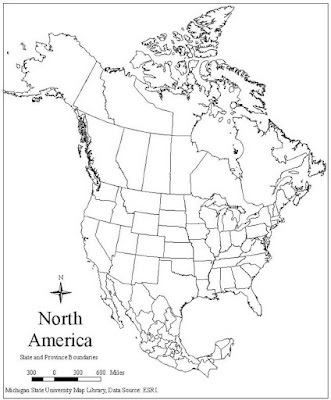
Here’s how Trump can annex both Greenland and Canada.
Greenland: first encourage them to vote for independence from Denmark. Denmark can’t object: it’s the right to self-determination of peoples, established by the League of Nations and Wilson’s Fourteen Points. And Denmark has already admitted Greenland has this right.
Then, no longer needing to pay off Denmark, the US offers every Greenlander one million dollars to cede sovereignty to the USA. There are only about 50,000 Greenlanders. This would only cost the US $50,000,000,000—fifty billion. Good price considering Greenland’s strategic importance and mineral deposits. Not only would every Greenlander be a millionaire; the US would then also begin developing Greenland’s resources, providing jobs for Greenlanders, and continuing royalties. Like Alaskans, who all currently get an annual payout, a reverse income tax, from resource royalites. On top of this, of course, every Greenlander gains the right to live and work in the USA. The much coveted “green card.”
Why wouldn’t they go for it? It is not as though they are giving up their sovereignty; they are not independent now. And they would never be viable as an independent state.
Canada: there are too many Canadians for a similarly simple deal. But here’s how it could happen. The long Quebec sovereignty debate has established the principle that any Canadian province has the right to separate. Alberta gets a raw deal now within Confederation, forced to pay equalization to most other provinces. They will be especially hard hit by Trump’s stiff tariffs. They are probably most dependent on cross-border trade with the US, for their oil and gas and agricultural products. At the same time, they are most valuable to the US, for that oil and gas. Not to mention the Alcan highway heading north from Edmonton to Alaska.
Canadian nomination meetings and party leadership contests are ridiculously vulnerable to foreign interference, as the Chinese have demonstrated. It would not take that much money for the US to maneuver supporters of Alberta independence and annexation into power provincially, working like China through local shell organizations. Externally, offer Alberta stand-alone statehood, a pipeline south, and a complete lifting of tariffs. Probably attractive enough to convince a majority of Albertans, if the politicians are also pushing the idea.
So Alberta votes for independence and annexation to the US, as Texas once did from Mexico.
Canada is now, for all practical purposes, cut in two, east to west; and it loses a huge part of its tax and resource base.
At this point, the attraction of remaining independent diminishes rapidly for other provinces. They should start falling like dominoes. British Columbia will be stranded, in relation to the rest of Canada. They needed a rail link to convince them to join Confederation in the first place. Now that link is gone.
Saskatchewan tends to move in tandem with Alberta. Saskatchewan will lose its route to market. Saskatchewan will want to join as well, if Alberta has joined.
If Alberta, BC, and Saskatchewan have all left Confederation, there go most of Canada’s natural resources. The attractiveness of remaining in Canada falls further for other provinces, now much impoverished.
Manitoba will probably fall next, wanting to stay with its Prairie neighbours rather than become a remote outpost of Ontario.
If the momentum is now not yet enough to pull all the other provinces in, the game can repeat. If either New Brunswick or Quebec pull out of that rump Canada, it is once again cut in two.
Target New Brunswick: small enough to subvert without too much financial outlay. If New Brunswick goes, PEI, Nova Scotia, and Newfoundland, stranded, will likely follow.
And as far as Quebec is concerned, there is no great loyalty to Ontario. Why not try for a better deal with Washington?
Leaving Ontario, and a landlocked Ontario. Not viable. Game, set, and match.
As for the Panama Canal, here’s a gambit: the US could put pressure on Panama by threatening to build a new, and wider, canal in cooperation with and through Costa Rica or Nicaragua; losing Panama virtually all its revenue from the present canal. Then it proposes, to forestall this, a deal with Panama in which Panama still gets a healthy remittance from the current canal under US management.
'Od's Blog: Catholic comments on the passing parade.
January 8, 2025
O'Leary's Gambit
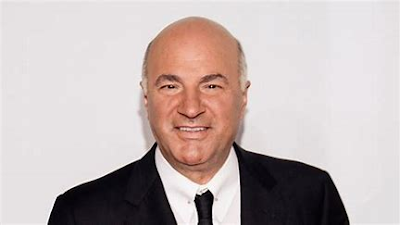
An obvious political opportunity has emerged for someone in Canada. A new and vital issue is suddenly on the table: should Canada join the US?
All the current national party leaders, Liberal, Conservative, NDP and Green, have adamantly rejected the idea.
This leaves an opening—indeed a need—for a Continentalist Party, prepared to negotiate the possibility.
Some will call this treason. But no more treasonous than Newfoundlanders campaigning for union with Canada prior to 1949; not to mention similar political campaigns in PEI, Nova Scotia, New Brunswick, or British Columbia in their turn. Canada is founded on a celebration of unification. This is entirely within that tradition.
The standard political commentators will scoff—according to opinion polls, they will point out, joining the US has only 15% support in Canada.
Just as they pointed out that Poilievre could never win an election, because his views are too extreme. O’Toole and Scheer supposedly had the wise and winning approach: triangulate, and stay as close to the views of the current polls as possible, to win the centre.
Leaders—like Trump or Poilievre—lead. They do not follow the polls, they change opinions. All that is needed for such a party to prosper, I suspect, is a well-spoken, charismatic leader.
The more so since it looks as though the left is in collapse, in Canada and around the developed world. This leaves a vacancy for an opposition party founded on principles different from the current left-right divide, in Canada and around the world as well.
Indeed, the Trump unification drive seems to already be stirring echoes, if X is any indication, in Britain, New Zealand, and Australia, with locals suggesting this would be a good idea for their country too.
This sort of a shift in the political debate has happened before. At the beginning of the 20th century, socialism and “progressivism” emerged, and the old electoral divide between liberal and conservative was supplanted everywhere by a new division between conservative-liberal “free marketers” and Marxist “welfare state”/“New Deal” parties. In Quebec, for a generation or more, the divide was between sovereigntist and federalist. As we see in Scotland, Wales, or Puerto Rico.
This new divide in Canada would be similar to that in Quebec: should Canada stay sovereign, or merge with the States?
All that is needed is a well-spoken, charismatic leader who sees the opportunity.
Kevin O’Leary is an entrepreneur. He is reputed to be skilled in spotting business opportunities; that is what he does on TV. He has always been interested in politics—he ran unsuccessfully for the Conservative leadership some years ago, failing by his estimation due to his lack of French. He is charismatic and telegenic.
I think he sees this opportunity, and may be on his way to forming such a new political party. He was shrewd enough to be first off the mark with a proposal for union, making himself the spokesman for the movement.
What O’Leary is promoting is not annexation, but an arrangement similar to the European Union. A shared passport, open borders, free movement of people and goods.
But this looks like little more than a sales technique. The EU, after all, is based on the premise of an “ever closer union.” The goal is a United States or Europe; it is only a question of how quickly it can be completed.
Furthermore, the US is not going to agree to surrendering any of its sovereignty to some higher body. The US is historically hostile to such ideas; and there is no reason for them to treat Canada as an equal partner.
And furthermore, the US’s prime stated goal is a unified defense perimeter and tight external border. This will already require a closer union than the EU has yet achieved.
No, no matter how it is framed, the governing authority for such a union would be the US government. All O’Leary is negotiating for is autonomous territory status instead of statehood. A worse deal for Canadians, but perhaps more palatable. At least until he can acclimatize Canadians to the new view out the Overton window.
'Od's Blog: Catholic comments on the passing parade.
January 7, 2025
The Canadian Dependance Movement
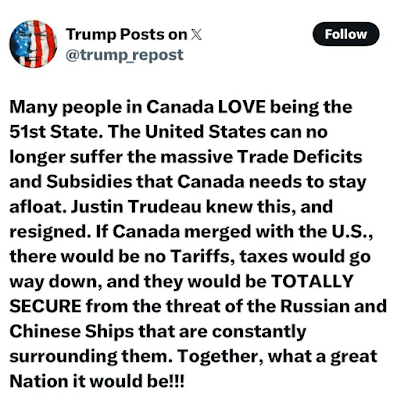
A Scot has elicited comments from Canadians on Trump’s suggestion that Canada become the 51st state.
I am surprised to see that almost all of the comments are positive. One New Zealander chipped in, “Can we be the 52nd?”
Is X a good reflection of the general Canadian public? Online polls are worth little in general, but recent studies indicate that X is quite a balanced sample of American opinion, just about equally representing left and right. So it is liable to be just as accurate for Canada.
More impressively, those in favour of union tend to give salient reasons. Lower taxes. A stronger currency. A stronger defense. More opportunity for careers.
Conversely, I have not seen anyone opposed to the union give any good argument against it. The opposition seems to be only emotional. Generally involving name-calling: accusations of treason or more general insults. One feels they have not thought about it.
I think something important is happening here.
I do feel regret over the possible loss of a distinct English-Canadian national culture, the culture of Anne of Green Gables, Mordecai Richler, Stephen Leacock, Al Purdy, and the like. But the Canadian government has already done everything it can to destroy that culture: declaring that Canada has no cultural mainstream, renaming everything, taking down statues, and subsidizing only aboriginal and alienated immigrant artists. A continental government might be more respectful. It could hardly be worse.



